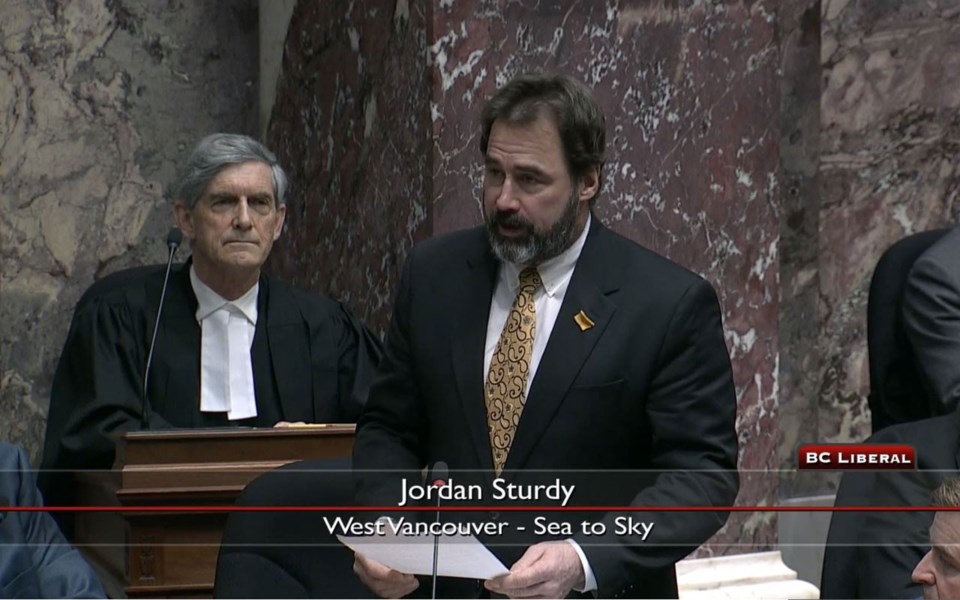While the provincial government will be sorting through budget estimates for each of its ministries over the next several weeks, deliberation over Ministry of Tourism, Arts and Culture spending is already wrapped—leaving Sea to Sky MLA Jordan Sturdy with some unanswered questions.
During budget deliberations in Victoria on Thursday, Feb. 27, Sturdy asked a number of questions related to the tourism industry, including specifics on labour shortages and the impact of moving Family Day (a decision widely panned by local officials at the time).
"We've had a couple of years now that it's been moved ... Have we any metrics on it to know what the impact is?" Sturdy said in a Feb. 28 interview.
"The answer is no, no and no. They didn't do any forecasting, they don't have any metrics, and they don't know what the impact was, other than they seem to believe that everybody in B.C. thinks it was a good idea."
Questions concerning tourism labour shortages—like how many positions are unfilled, in which industries, in which parts of the province, and what strategies are being used to ease the pain—produced similarly empty answers for Sturdy.
"The only statistic that the minister could trot out was that she says that they have forecasted that by 2028 they will be short 106,000 employees in the tourism sector," Sturdy said, adding that it would be nice to know some specifics. "They weren't able to share or provide any of that data, so that was a little bit disappointing."
Funding for B.C.'s Ministry of Tourism, Arts and Culture decreased in the government's Feb. 18 budget—from $164 million forecasted for 2019-20 to $161 million annually for the next three years—prompting the Tourism Industry Association of BC (TIABC) to speak out (see
Pique, Feb. 28: "No money for regional transit in provincial budget.").
"It's concerning, frankly," Sturdy said. "It does obviously reflect the spending priorities of the government, and doesn't necessarily bode well for our region."
In an emailed statement, a ministry spokesperson noted that the government launched a Strategic Framework for Tourism in B.C. last year, with one of it stated goals to grow the workforce.
"As outlined in the Strategic Framework, the minister will continue to champion tourism careers as a profession and work to ensure this industry remains an economic driver, job creator and community builder," the spokesperson said.
As for funding, the ministry remains committed to supporting the industry through Destination BC (DBC), the spokesperson said.
"Government provides Destination BC with $51.373 million in annual funding. DBC will reduce expenditures by 2.4 per cent through the careful management of expenses and discretionary spending including: hiring, travel, contracts. DBC will continue to provide high quality international tourism promotion and ensure the province remains competitive and a leading tourism destination."
Tourism Whistler president and CEO Barrett Fisher praised the government for its commitment last year to include the Resort Municipality Initiative (RMI) program in its base budget, while stressing the importance of stable funding for other industry aspects.
The RMI program—intended to assist small, tourism-based municipalities to support and increase visitation—has doled out more than $129 million in funding to 14 communities since 2006.
Whistler got $7.5 million in RMI funding in 2019, and has received a total of $93 million since 2006.
But tourism funding is equally as important, "because if you take your foot off the gas pedal you will see a decline in awareness levels," Fisher said.
For example, Tourism Whistler monitored awareness levels of the resort before, during and after the 2010 Olympic Winter Games, she said.
"And while Whistler saw quite a spike in awareness levels during the Games, it did reduce considerably post-Games," she said. "So it's not a permanent benefit. You have to continue to nurture it."
Like TIABC, Fisher stressed the importance of long-term, stable funding for the industry.
"At the same time, we recognize that in any economic environment there will be challenges that arise, and in B.C., there have been challenges with other industries such as forestry and mining ... but in an ideal world, we're not supporting one industry's needs potentially at the expense of another," she said. "So it's really how we work collaboratively to ensure that we're supporting the industries who have a track record, who are contributing, and who are a proven economic driver for the province."
Tourism has been big business in B.C. in recent years, now consisting of more than 19,000 businesses employing more than 160,000 people and generating more than $18.4 billion in revenue—and yet, the word "tourism" appears just three times in the government's most recent budget and fiscal plan (and the word "resort" is missing altogether).
"There's certainly a red flag there, of concern, when we see reductions in tourism spending, because tourism has been, to a certain degree, a shining star in British Columbia's economy," Fisher said. "And tourism might be the golden child today, but if you stop investing in it, it may not be that tomorrow."




